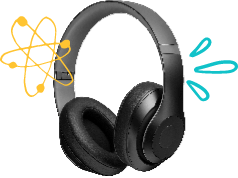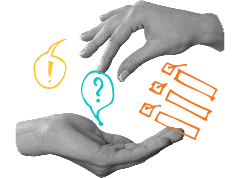Utopia (Thomas More)
- Fiche de cours
- Quiz et exercices
- Vidéos et podcasts
Découvrir la vision politique et philosophique de More.
- Utopia est un essai philosophique écrit par l’anglais Thomas More en 1516.
- La première partie du livre décrit les injustices sociales et politiques dont souffre le peuple anglais.
- La deuxième partie décrit Utopia, qui ressemble pour More à ce que serait l’Angleterre si elle était dirigée correctement.
- À travers cette ville imaginaire, More invite les Anglais à remettre en cause la société de l’époque et aspirer à un monde meilleur.
Who has never dreamt of living in a perfect world, a world where everything would be idyllic, the ideal place in fact? The first writer to develop this idea was the English philosopher Thomas More, in 1516. He wrote Utopia in Latin and chose the title from the word “topos” (place) to which he added a negative prefix (ou). We can thus infer from the title that Utopia is a place that does not exist, that cannot exist either, but in the imagination of the author.
Utopia is divided into two parts. The first one deals with the social and political injustices that the people of England have to face while the second part is a description of the place invented by Thomas More, the island of Utopia. We can assert that Utopia is for More what England would be like if the country were ruled properly. Here are the main characteristics of the place:
- 100 000 people live on the island. As a remote place, Utopia does not have to undergo the influence of the outer world. 54 cities have been erected on the island and the language, the customs, the laws and the institutions are identical. Moreover, each city is built on the same plan as the others. It is possible to travel from city to city with a passport. Those who do not have this passport become slaves.
- Agriculture is part of the people’s education. What they eat or wear comes from the land.
- Clothing is simple as everybody dresses the same.
- Private property does not exist on Utopia and its inhabitants have to switch houses every ten years so as to avoid routine. We have to say here that the doors to the houses do not have locks.
- The Utopians worship one god whom they call “father” and the priests can get married.
- There is no currency on Utopia, but each person can go to the market place and get what he wants, providing he takes only what he needs.
- Reading books and holding philosophical discussions are highly valued on the island as it is necessary to think and develop the mind.
- Idleness is forbidden and everyone must work six hours a day. Women usually work in the textile trade while men are carpenters or iron workers.
- Adultery is a serious crime. Once can be forgiven but those who do it twice become slaves. They will get the most degrading jobs.
- There is a specific number of children allowed per family. If the number is not respected, extra children are given to families who are in need of children.
- As Utopians do not want to expand their territory, violence and war are never envisaged though they would be prepared if someone thought of invading them.
According to the author, Utopia is an imaginary place which was created and developed in a book to make people think about their condition, denounce it and dream for something better. Thomas More was a humanist who wanted to spread philosophical messages among the population of his time, and Utopia is the result of this imagination. He needed to express what he felt about the inequalities of his time, both religious and social. He dreamt of an equalitarian society based on common welfare. He thought that he could criticize and reform the existing order so as to achieve something… utopian!
Yet, we may wonder if he really succeeded in converting his fellow citizens to his idea for, even though Utopia is filled with positive aspects, uniformity seems to be the keyword of the book, doesn’t it? Same cities, same houses, same clothes… Once you have read the book, the first question is: would I like to live in such a place? I am sure that not everybody would. But, as a humanist philosopher, was it not More’s intention to make us think about what he was writing?
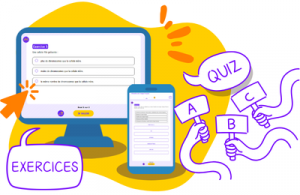
Des quiz et exercices pour mieux assimiler sa leçon
La plateforme de soutien scolaire en ligne myMaxicours propose des quiz et exercices en accompagnement de chaque fiche de cours. Les exercices permettent de vérifier si la leçon est bien comprise ou s’il reste encore des notions à revoir.
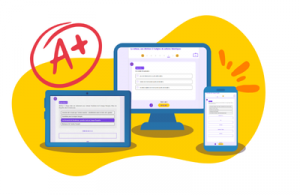
Des exercices variés pour ne pas s’ennuyer
Les exercices se déclinent sous toutes leurs formes sur myMaxicours ! Selon la matière et la classe étudiées, retrouvez des dictées, des mots à relier ou encore des phrases à compléter, mais aussi des textes à trous et bien d’autres formats !
Dans les classes de primaire, l’accent est mis sur des exercices illustrés très ludiques pour motiver les plus jeunes.
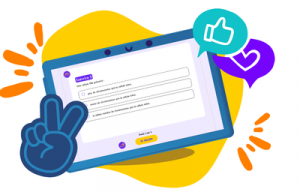
Des quiz pour une évaluation en direct
Les quiz et exercices permettent d’avoir un retour immédiat sur la bonne compréhension du cours. Une fois toutes les réponses communiquées, le résultat s’affiche à l’écran et permet à l’élève de se situer immédiatement.
myMaxicours offre des solutions efficaces de révision grâce aux fiches de cours et aux exercices associés. L’élève se rassure pour le prochain examen en testant ses connaissances au préalable.
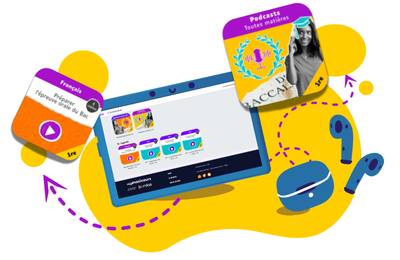
Des vidéos et des podcasts pour apprendre différemment
Certains élèves ont une mémoire visuelle quand d’autres ont plutôt une mémoire auditive. myMaxicours s’adapte à tous les enfants et adolescents pour leur proposer un apprentissage serein et efficace.
Découvrez de nombreuses vidéos et podcasts en complément des fiches de cours et des exercices pour une année scolaire au top !
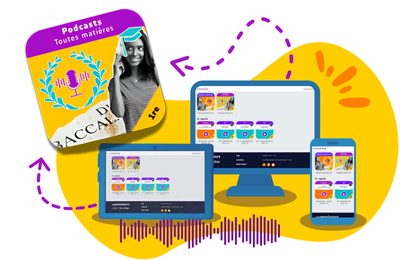
Des podcasts pour les révisions
La plateforme de soutien scolaire en ligne myMaxicours propose des podcasts de révision pour toutes les classes à examen : troisième, première et terminale.
Les ados peuvent écouter les différents cours afin de mieux les mémoriser en préparation de leurs examens. Des fiches de cours de différentes matières sont disponibles en podcasts ainsi qu’une préparation au grand oral avec de nombreux conseils pratiques.
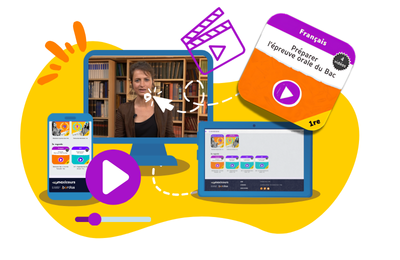
Des vidéos de cours pour comprendre en image
Des vidéos de cours illustrent les notions principales à retenir et complètent les fiches de cours. De quoi réviser sa prochaine évaluation ou son prochain examen en toute confiance !



